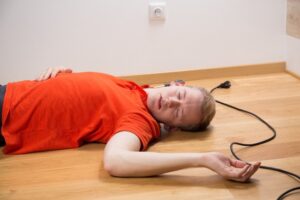By Stephen Bishop. Last Updated 16th May 2024. This guide will explain how to claim compensation for injuries caused by trailing leads hazards. Trip accidents could cause injury in the workplace and public places.
Employers are legally responsible for keeping employees safe when they are at work. In other words, they owe a duty of care. Likewise, parties that manage spaces the public has access to owe visitors a duty of care.
If a trailing lead caused an accident which injured you, and it happened because of the negligence of someone who owed a duty of care, then you could potentially claim personal injury compensation for your injuries. Please speak to Legal Helpline today to see if you can claim. If you are eligible, knowledgeable lawyers from our panel can work on your case.
Contact Legal Helpline today:
- Call our advice line on 0333 000 0729
- Make an online enquiry in writing
- Use the help widget below to speak to us
Continue reading to learn more about claiming compensation for injuries caused by trailing leads hazards.
Select A Section
- What Are Trailing Leads Hazards?
- Trips And Falls Caused By Trailing Leads, Wires And Cables
- Risk Assessments For Trailing Leads Hazards
- How Common Are Workplace Slips, Trips Or Falls?
- What Are Compensation Payouts For Trailing Leads Injuries?
- Claim For Injuries Caused By Trailing Leads Hazards
What Are Trailing Leads Hazards?
You may wonder what are trailing leads hazards. A lead, wire or cable can become hazardous when positioned in a way that can trip up a passerby. Potential lead or cable hazards should be fixed or covered appropriately to prevent trip and fall accidents on the premises. Failure to fix a trailing cable or lead could be an example of a breach of duty of care and cause an accident, for example, an accident in a shop.
Claiming Compensation For Trailing Leads Hazards Injuries
You may be able to claim compensation for trip injuries under the following circumstances:
- Firstly, you were in a situation where another party owed you a duty of care. For example, you were at work or on the premises of a business like a shop.
- Secondly, the party acted negligently, breaching their duty of care. For example, a shop’s management failed to attach a trailing wire to the wall.
- Consequently, a trip and fall accident took place, which injured you.
Please get in touch with Legal Helpline today. An expert advisor can assess your case and let you know if you are eligible for compensation.
Trips And Falls Caused By Trailing Leads, Wires And Cables
Trailing leads, wires and cables could all pose trip hazards. If a trailing wire, lead or cable tripped you up, you might have experienced the following injuries:
- You might hurt your back and suffer a musculoskeletal injury.
- You may hit your head, causing a head injury or concussion.
- If you try to break your fall using your hand, you may suffer a wrist injury on impact.
- You could experience a knee injury if you land on your knees.
- Severe falls can result in broken or fractured bone injuries.
- Likewise, you can suffer sprains or strains to your ligaments or tendons.
Risk Assessment For Trailing Leads Hazards
Under the Health and Safety at Work etc. Act 1974, employers have a duty of care to their workers. Similarly, businesses and other premises are responsible for their visitors’ safety under the Occupiers’ Liability Act of 1957. As part of the duty of care, parties should carry out trailing cables risk assessments to identify hazards.
When employers produce a risk assessment, they must identify the following:
- Identify health and safety hazards, such as the risk of a trailing wire
- Evaluate the likelihood that the risk will cause an accident
- Record findings from the risk assessment
- Remove the hazard or, if this is not possible, reduce the risk it poses
If you have any questions about trailing leads hazards claims, speak with our advisors today.
How Common Are Workplace Slips Or Falls?
A slip or fall could occur in the workplace. Statistics provided by the Health and Safety Executive explain that slips, trips and falls were the leading cause of non-fatal accidents at work.
30% of accidents reported to the HSE under the Reporting of Injuries, Diseases and Dangerous Occurrences Regulations 2013 in 2021/22 were slips, trips and falls on the same level. While we do not have statistics on the number of these caused by trailing wires, it was the leading cause of reported injury at work in this time period.
What Are Compensation Payouts For Trailing Leads Injuries?
You may be asking how much compensation may be awarded if you successfully claim for injuries caused by trailing leads. Your compensation payout could include general damages and special damages. General damages compensate you for whatever pain and suffering has been caused by your injuries.
Those valuing your personal injury claim for general damages may use a document called the Judicial College Guidelines (JCG). It lists various kinds of injuries, including many that may be caused by trailing leads hazards, alongside guideline compensation brackets. You can take a look at some of these brackets in the table included below.
Please note that the table should be viewed as only a guide and the first entry is not based on the JCG.
| Type Of Injury | Notes | Possible Compensation |
|---|---|---|
| Multiple Serious Injuries And Special Damages | If you have a valid claim for multiple serious injuries caused by a trailing leads hazard, then you may receive a payout covering all injuries plus any related special damages, such as the cost of home care provisions. | Up to £250,000+ |
| Head Injuries | (c) Moderate (ii) - An injury which results in intellectual deficit. The injury reduces or removes the ability to work. | £110,720 to £183,190 |
| Head Injuries | (c) Moderate (iii) - Injuries which affect the memory and the ability to concentrate. | £52,550 to £110,720 |
| Knee Injuries | Severe (a) (iii) - Injuries that result in less severe disabilities including discomfort and movement limitation. | £31,960 to £53,030 |
| Knee Injuries | Moderate (b) (i) - Injuries which include less severe forms of cartilage tears, dislocations and which lead to minor instability. | £18,110 to £31,960 |
| Wrist Injuries | (a) - Loss of wrist function. | £58,110 to £73,050 |
| Wrist Injuries | (b) - Permanent disability in the wrist which is significant. | £29,900 to £47,810 |
| Elbow Injuries | Severe (a) - Elbow injuries which cause a disability and which are severe. | £47,810 to £66,920 |
| Shoulder Injuries | Serious (b) - Including injuries which restrict the shoulder joints movement. The humerus bone may be fractured. | £15,580 to £23,430 |
| Ankle Injuries | Moderate (c) - Sprains, strains and fractures which lead to less serious disabilities. | £16,770 to £32,450 |
If you can claim general damages, then special damages may also be included in your payout to compensate you for financial losses that have occurred due to your injury. Examples of what could be covered under special damages includes:
- Loss of earnings if the injuries from your accident have forced you take unpaid time off work to recover.
- The cost of medications or certain private treatments, such as physiotherapy or chiropractor sessions.
- The cost of home adjustments or certain equipment needed to aid your recovery.
For more advice on how much your personal injury claim could be worth after tripping on a trailing leads hazard, read on or contact our advisors for free today.
Claim For Injuries Caused By Trailing Leads Hazards
If you have suffered an accident that was not your fault, please get in touch with our team today. We work with a panel of skilled lawyers and can appoint a specialist personal injury lawyer from our panel to handle your claim. The panel has solid experience handling claims for accidents at work and public places accidents, including those caused by trailing leads hazards.
The solicitor can handle your case with a No Win No Fee agreement, in particular, a form of this agreement called a Conditional Fee Agreement. No Win No Fee means you generally don’t pay your lawyer upfront, while the claim is ongoing or if it’s not a success. If you’re awarded compensation, a success fee will be deducted by your lawyer.
Please get in touch with us today to see if you are eligible to claim:
- Ask our team a question using the Live Support widget
- Call 0333 000 0729 to speak with an advisor
- Fill out our online enquiry form
Guides Related To Trailing Leads Hazards
These guides might be helpful to you:
I Had A Slip On A Wet Floor. Could I Claim Compensation?
£10,000 Compensation Payout For Falling Off A Chair Injury
Inadequate Training At Work – Am I Eligible To Claim?
The causes and prevention of slips and trips at work – an HSE guide
Slips, trips and falls- Guidance from the Royal Society for the Prevention of Accidents
A guide to back pain from the NHS
If you have any more questions about claiming for injuries caused by trailing leads hazards, speak with a member of our team today.




